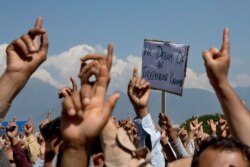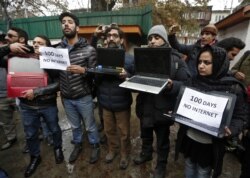India’s Home Ministry has developed plans to create a cybercrime division made up of volunteers who will police the internet for evidence of crimes, including child abuse, terrorism and anti-national sentiment.
Details of the plan became public as India moved to end a series of high-speed internet restrictions in Jammu and Kashmir. The blocks have been in place since August 2019, when residents protested New Delhi’s revoking of Article 370, which granted the Muslim-majority state rights that include its own constitution.
Cybercrime has increased rapidly in India, with most cases involving fraud, according to data from India’s National Crime Records Bureau. Other key issues include sexual exploitation, blackmail and defamation.
India’s Home Ministry has called on citizens to help counter these crimes by registering in one of three categories: identifying unlawful activity; promoting awareness to vulnerable groups; and working as an expert in more specialized areas such as malware analysis.
But international rights groups and journalist associations say the broad definitions for some of the violations could be used to further harass or censor media outlets and chill free speech in such regions as Kashmir. Asking citizens to police the internet could lead to bullying and eliminate opposition or diverse voices, they are warning.
Authorities have previously used accusations of damaging national stability or anti-terror legislation against Kashmiri media that report critically on the government and police, or that cover separatist activities.
Late last month, Jammu and Kashmir police filed First Information Reports — the first stage in bringing a criminal case — against the Kashmir Walla and The Kashmiriyat, accusing the outlets of spreading false news that could incite unrest and public mischief with their coverage of a school allegedly being pressured by security forces to hold an India’s Republic Day.
Online moderation
The cyber volunteers would be part of a Cyber Crime Coordination Center established as a national response to tackle cybercrime.
The center’s website states its objective as bringing “together academia, industry, public and government in prevention, detection, investigation and prosecution of cybercrimes.”
Volunteers would help law enforcement identify, report and remove illegal content online. Along with child-abuse violations, the flaggers would search for content deemed to go against the sovereignty or defense of India and state security, as well as “content aimed at disturbing public order.” Volunteers are advised on the ministry site to study Article 19 of the constitution, which guarantees the right to freedom of opinion and expression.
VOA sent requests to India’s Home Ministry and its Cyber and Information Security Division for an interview about the cyber volunteer division, but its emails were not answered. The Jammu and Kashmir hub for National Cyber Crime Reporting did not respond to VOA’s requests for comment or further details.
India isn’t the first country to recruit volunteers to monitor online speech. Authorities in repressive countries like China and Iran have mobilized thousands of people to monitor social media, which has restricted freedom of expression online, the U.S. based nonprofit Freedom House has found.
“It’s a cause for concern that the Indian government may seek to import this model to Jammu and Kashmir,” said Kian Vesteinsson, a research analyst for the technology and democracy division at Freedom House.
While the restoration of high-speed internet in Jammu and Kashmir is welcome, “the prospect of increased online censorship and surveillance through ‘cybercrime volunteers’ is not,” Vesteinsson told VOA.
He said the consequences for Kashmiris could be dire.
“Activists and journalists working may consider censoring themselves. Members of marginalized communities will think twice about discussing their opinions online. With the Indian government’s turn toward Hindu nationalism, Muslims, in particular, may face increased surveillance and feel more pressure to silence themselves online,” Vesteinsson said.
Raman Jit Singh Chima, of the digital rights group Access Now, agreed, saying the use of internet shutdowns, website censorship orders and digital surveillance by India’s government is having a chilling effect on the rights of all Indians to use the internet for free speech and peaceful assembly.
Describing the cyber volunteer plan as “ill-advised,” Chima said it could increase “fears of online vigilantism and surveillance rather than helping vulnerable communities in India feel more safe.”
“The Ministry of Home Affairs must first prioritize reform of Indian surveillance laws and practices. India falls behind other major democracies in lacking judicial approval for communications interception and independent oversight of surveillance powers,” said Chima, who is the digital rights group’s senior international counsel and Asia policy director.
Critics censored
Ishfaq Tantry, general secretary of the Kashmir Press Club, told VOA that democracy rests on freedom of speech and is enshrined in India’s constitution. This essentially is an acceptance of the diversity of opinion and dissent, he said.
Tantry questioned the legality of setting up cybercrime volunteers and said critical journalism in India already is under assault, including through legal action against media and the issuing of summonses or threats over coverage.
However, Trisha Ray, an associate fellow at the Observer Research Foundation, said some content moderation is needed in India.
Ray, who is part of the foundation’s technology and media program, said India has a capacity problem when it comes to flagging and removing content that is extremist or used for radicalization. Major platforms like Twitter and Facebook struggle to respond to requests, but it is an even bigger challenge for smaller “homegrown” platforms like Koo, Josh and Chingari, she noted.
A haphazard implementation of the program risks damaging government efforts to rebuild trust with civilians and build bridges with communities in Kashmir, according to Ray. She added that a lack of defined guidelines and limited transparency provide a clumsy solution to a complicated problem.
More divisiveness
Journalists with whom VOA spoke, who have faced charges related to their reporting, said the use of civilians to police the internet could promote self-censorship and add to an already divisive atmosphere.
The plan could result in cyber bullies and “will criminalize the space to think, to feel and to act. This cyber renegadism will promote a culture of self-censorship,” Gowhar Geelani a Kashmiri-based journalist and commentator, told VOA.
“Stifling free speech in the name of content moderation is in essence aimed at killing the idea [of journalism],” Geelani said, adding, “An obituary of civil society is being written.”
Qazi Shibli, editor of The Kashmiriyat, said the use of volunteers runs the risk of alienation, and a lack of clear guidelines could result in unnecessary legal action.
“Scrutinizing content as 'anti-national,' without an actual definition of what constitutes 'anti-national' nature, speech or work, will result in erratic actions by citizen volunteers. It can be used to silence government opposing voices without responsibility under the Unlawful Activities [Prevention] Act, which could lead to detention and a jail term,” said Shibli.






